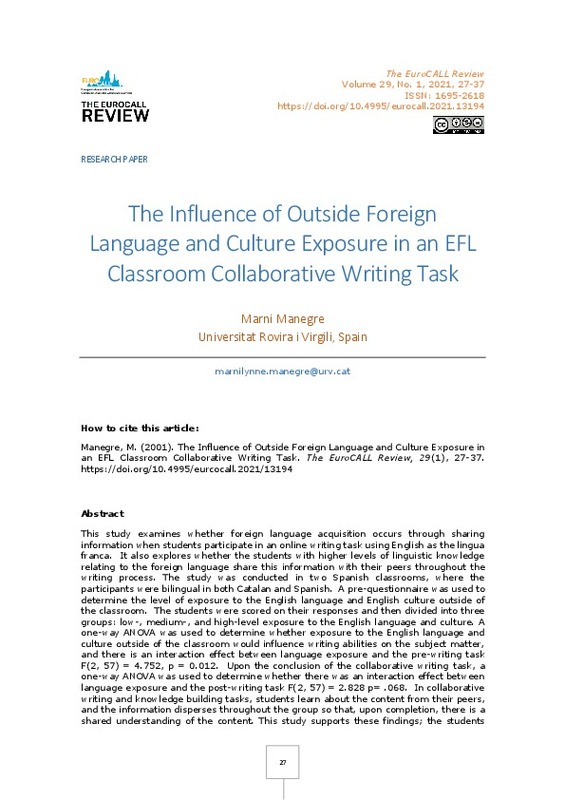Álvarez Valencia, J.A. & Fernandez Benevides, A. (2017). Using social networking sites for language learning to develop intercultural competence in language education programs. Journal of International and Intercultural Communication. ISSN: 1751-3057 (Print) 1751-3055 https://doi.org/10.1080/17513057.2018.1503318
Álvarez Valencia, J. A. (2016a). Language views on social networking sites for language learning. The case of Busuu. Computer Assisted Language Learning, 29(5), 853-867. https://doi:10.1080/09588221.2015.1069361
Álvarez Valencia, J. A. (2016b). Social networking sites for language learning: Examining learning theories in nested semiotic spaces. Signo y Pensamiento, 35(68), 66-84. https://doi:10.11144/Javeriana,syp35-68.snsl
[+]
Álvarez Valencia, J.A. & Fernandez Benevides, A. (2017). Using social networking sites for language learning to develop intercultural competence in language education programs. Journal of International and Intercultural Communication. ISSN: 1751-3057 (Print) 1751-3055 https://doi.org/10.1080/17513057.2018.1503318
Álvarez Valencia, J. A. (2016a). Language views on social networking sites for language learning. The case of Busuu. Computer Assisted Language Learning, 29(5), 853-867. https://doi:10.1080/09588221.2015.1069361
Álvarez Valencia, J. A. (2016b). Social networking sites for language learning: Examining learning theories in nested semiotic spaces. Signo y Pensamiento, 35(68), 66-84. https://doi:10.11144/Javeriana,syp35-68.snsl
Banks, J. A., & Banks, C. A. M. (Eds.) (2010). Multicultural education: Issues and perspectives. (7th ed.) Hoboken, NJ: Wiley.
Benediktsson, A. I., & Ragnarsdottir, H. (2019). Communication and Group Work in the Multicultural Classroom: Immigrant Students' Experiences. European Journal of Educational Research, 8(2). 453-465. https://doi:10.12973/eu-jer.8.2.453
Bereiter, C., & Scardamalia, M. (2010). Can Children Really Create Knowledge?. Canadian Journal of Learning and Technology / La revue canadienne de l'apprentissage et de la technologie, 36(1). Canadian Network for Innovation in Education. https://www.learntechlib.org/p/43133/
Boesch, B. (2014). The importance of the professor in college classroom climate for immigrant students. College Quarterly. 17(4).
Brown, K. L. (2003). From teacher-centered to learner-centered curriculum: Improving learning in diverse classrooms. Education, 124(1), 49-54.
Byram, M. (1997). Teaching and assessing intercultural communicative competence. Clevedon: Multilingual Matters.
Chen-Chung, L., Pin-Ching, W., & Shu-Ju, T., (2016). An analysis of student engagement patterns in language learning facilitated by Web 2.0 Technologies. ReCALL 28(2), 104- 122. https://doi.org/10.1017/S095834401600001X
Consell Superior d'Avaluació del Sistema Educatiu (2015). Avaluació del projecte COMconèixer. Barcelona, Departament d'Ensenyament,
Consell Superior d'Avaluació del Sistema Educatiu, col·lecció Documents 32. http://cdl3.cdl.cat/COMconeixer/docs/Avaluacio_Projecte_COMconeixer.pdf
Furstenberg, G. (2010). Making Culture the Core of the Language Class: Can It Be Done? The Modern Language Journal, 94(2), 329-332. https://doi.org/10.1111/j.1540-4781.2010.01027.x
Kimmel, K., & Volet, S. (2010). Significance of content in university students' (meta) cognitions related to group work. A multi-layered, multi-dimensional and cultural approach. Learning and Instruction, 20(6), 449-464. https://doi.org/10.1016/j.learninstruc.2009.05.004
Kramer Moeller, A., & Nugent, K. (2014). Building intercultural competence in the language classroom. Faculty Publications: Department of Teaching, Learning and Education. 161. Retrieved from: http://digitalcommons.unl.edu/teachlearnfacpub/161
Lanteigne, B. (2007). A different culture or just plain rude? English Teaching: Practice and Critique. 6(2), pp. 89-98.
Lee, L. (2010). Fostering reflective writing and interactive exchange through blogging in an advanced language course. ReCALL, 22(2), 212-227. https://doi:10.1017/S095834401000008X
Li, Y., & Dervin, F. (2018). Interculturality in a Different Light: Modesty Towards Democracy in Education? Intercultural Communication Education, 1(1), 12-26. https://dx.doi.org/10.29140/ice.v1n1.28
Manegre, M., Gutiérrez-Colón, M., & Gisbert, M. (2019). Foreign Language Learning in Knowledge Forums: using a knowledge-building forum in an EFL classroom. The EuroCALL Review, 27(1), 3-13. https://doi.org/10.4995/eurocall.2019.11150.
Melo-Pfeifer, S., & Schmidt, A. (2013). "Dessine-moi tes langues et je te dirai qui tu es": le rapport des enfants lusodescendants au portugais comme Langue-Culture d'Origine en Allemagne. Recherches en didactique des langues et des cultures. Les cahiers de l'Acedle, 10(1). https://doi.org/10.4000/rdlc.1512
Scardamalia, M., & Bereiter, C. (1991). Higher levels of agency for children in knowledge building: A challenge for the design of new knowledge media. The Journal of the learning sciences, 1(1), 37-68. https://doi.org/10.1207/s15327809jls0101_3
Sert, O., & Balaman, U. (2018). Orientations to negotiated language and task rules in online L2 interaction. ReCALL, 30(3), 355-374. https://doi:10.1017/S0958344017000325
Sinicrope, C., Norris, J. & Watanabe, Y. (2007). Understanding and assessing intercultural competence: A summary of theory, research, and practice. (Technical report for the Foreign Language Program Evaluation Project). Retrieved from http://hdl.handle.net/10125/40689
[-]









